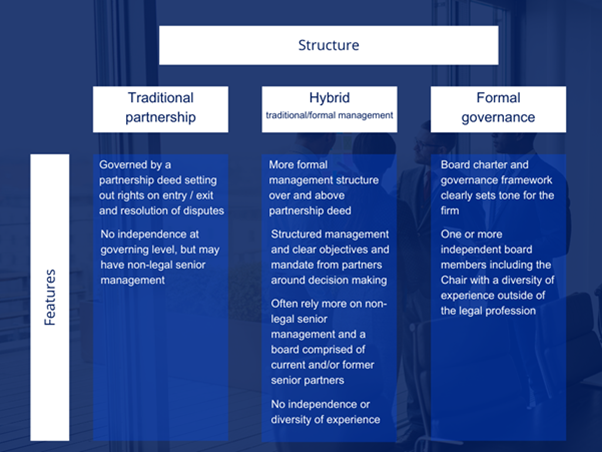In this article, Directors Australia Board Recruitment Specialist, Brad Booth, explores how appointing independent non-executive directors with diverse backgrounds outside of law can enhance governance, strategic decision-making, and client satisfaction.
In the dynamic landscape of legal services, Australian law firms are constantly seeking avenues to fortify their position, navigate growth challenges, and ensure longevity in an increasingly competitive environment. As an indication of the progression of law firm management, one avenue gaining traction is the appointment of independent non-executive directors with a diversity of experience outside of law to their boards. This is heralded by some as a cornerstone for sustainable growth and true effective governance within legal practices.
Over the last few decades, we have seen a growing trend of firms ‘corporatising’ their management structure. The business of law is in fact big business and as such requires new insights and expertise at both a c-suite and board level. The initial movement was partly a recognition that not all talented lawyers are talented business managers but also, a move to a corporate structure for some was a more effective way of ensuring business longevity and maximising financial return. These drivers certainly still exist but now perhaps with a critical client driven overlay that demands more transparency, independence and diversity of experience in law firm governance. Clients are wanting to see boards that reflect their own, that is, a genuine mix of non-executive directors with a diverse range of experience.
It’s no surprise that many law firm partners (and business owners generally) are not always enamoured with the prospect of having someone else tell them what to do. That element hasn’t changed but the need to position the firm to better handle the complex and evolving legal profession and global issues has become more critical. Previously, and perhaps to solve the control issue, beyond the establishment of a governing board (telling partners what to do!), law firms might have considered the formation of an advisory board to complement their governance structure.
While a governing board primarily focuses on strategic oversight and decision-making, an advisory board offers specialised counsel and industry insights without the fiduciary responsibilities associated with governance. This distinction is crucial, as it allows firms to tap into a diverse pool of expertise and perspectives without diluting the authority of the governing board. Advisory boards, often composed of industry or sector luminaries, legal experts, and business leaders, can provide invaluable guidance on emerging trends, technological advancements, and best practices, thereby augmenting the firm’s competitive edge and adaptability.
Although the appointment of an advisory board might have solved the control issue for partners, the real issue now is likely to be the lack of independence at a governing board level. Issues impacting both private and public sector clients around ESG, technology (cyber, AI and privacy) and diversity now require a level of genuine independence at board level not seen previously. Clients are likely to expect more than a statement of compliance and instead will want to see clear and transparent governance framework to ensuring compliance.
Progression of law firm management

As a firm’s management structure progresses to one that reflects a normal corporate governance structure, the question often arises: why should law firms consider appointing independent members with more diverse experience to the board? The answer lies in the multifaceted benefits that such a structure can confer upon these firms, ranging from superior strategic guidance to enhanced credibility with clients and resilience. With this in mind, the following are some of the key reasons why law firms might consider not only having a board structure in place but also consider the importance of the appointment of independent non-executive directors to the board with a diversity of experience outside of the legal profession.
Strategic growth management
Central to the rationale for establishing a board is the imperative of managing growth effectively. Law firms, like any business entity, encounter periods of rapid expansion that necessitate astute decision-making and prudent oversight. Bolstering the board with independent members that have a diversity of experience can provide a platform for better overall decision making for the benefit of partners and stakeholders. The independence and diversity of thought can inject invaluable insights, improved checks and balances that can steer the firm through these critical phases.
Expertise enhancement and succession planning
Legal practitioners are renowned for their specialised skills and deep domain knowledge. However, as firms grow, the need for complementary expertise becomes apparent. The presence of diverse members on the board might bring a wealth of experience in pivotal areas such as capital raising, market expansion, and strategic repositioning. Moreover, they play a pivotal role in facilitating seamless succession planning, ensuring smooth transitions and continuity in leadership – a vital consideration for the long-term viability of legal practices.
Leadership, control, and objectivity
A well-constituted board not only provides strategic direction but also enhances the firm’s leadership and control mechanisms. Independent directors, with their diverse and impartial perspective, foster an environment conducive to informed decision-making, free from emotional biases or conflicts of interest (internal and external). This objectivity is particularly crucial when navigating complex legal landscapes, making critical business judgments including the resolution of potentially very damaging internal conflicts. The issue of genuine independence and objectivity is a real and emerging issue for firms to consider when establishing or reviewing its board.
Innovation and networking
Beyond governance and oversight, independent directors with diverse experience can inject fresh perspectives and stimulate innovation within legal firms. By challenging conventional wisdom and encouraging experimentation, they foster a culture of continuous improvement – a prerequisite for staying ahead in a dynamic industry. Moreover, independent directors with a diverse background often bring extensive networks and valuable connections, opening doors to new opportunities and collaborations, especially for firms eyeing expansion into new markets or service areas.
Enhanced credibility and market standing
In an era where trust and credibility are paramount, the presence of independent members with diverse expertise on the board can significantly enhance a law firm’s reputation in the eyes of clients, financiers, and investors. It signals a commitment to robust governance practices, transparency, and long-term sustainability attributes that resonate strongly with stakeholders in the legal ecosystem. Clients are now wanting to see boards that reflect their own, that is, a governing body with a genuine mix of independent directors that have a diverse range of experience outside of law. We have seen some of the recent ethical challenges faced by professional services firms around the use of confidential information for commercial purposes and also significant data breaches in law firms. These matters ought to be at the forefront of any board and independence from the sector, perhaps at board chair level, might now be the base requirement to ensure the business remains on track in all respects.
Conclusion
The decision to compliment a board with independent non-executive directors with a diversity of experience represents a strategic imperative for Australian law firms seeking to thrive in a rapidly evolving internal and external landscape. Ideally, the role of Chair should be occupied by an independent non-executive director with a diversity of experience and ideally at least one or more additional independent non-executive directors. By harnessing the collective wisdom, expertise, and objectivity of this independence and diversity, these firms can not only navigate growth challenges but also foster innovation, enhance credibility, and fortify their position as trusted advisors. As the legal profession continues to evolve, embracing this governance model may well prove to be the catalyst for sustained success and resilience in an ever-changing environment.
Directors Australia works with the boards of publicly listed, government, private, APRA-regulated and not-for-profit organisations across all sectors and industries Australia-wide, recruiting exclusively for boards, board committees and advisory councils.
To learn more about how we can partner your organisation with the right directors, contact us today at [email protected] | 1300 890 267 or visit: https://directorsaustralia.com.au/our-services/director-recruitment/.

Brad Booth
Board Recruitment Specialist






